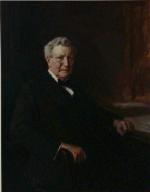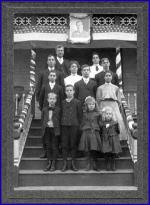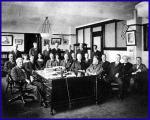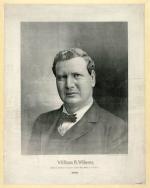![header=[Marker Text] body=[First secretary of labor in 1913-21, Congressman, and labor leader, spent the greater part of his life here. He was born in Scotland, 1862, worked in the Arnot mines, rising to prominence as a labor statesman. His home is opposite. Died in 1934.] sign](http://explorepahistory.com/kora/files/1/10/1-A-2CE-139-ExplorePAHistory-a0k3j4-a_450.jpg)
Mouse over for marker text
Name:
William B. Wilson
Region:
Allegheny National Forest Region
County:
Tioga
Marker Location:
U.S. 15 just S of Blossburg
Dedication Date:
October 29, 1948
Behind the Marker
William B. Wilson was an exceptional labor leader for much of his life, helping to organize and guide the United Mine Workers of America (UMWA). But in some ways his childhood was typical of other miners in Pennsylvania's bituminous coal fields. His father Adam was a skilled Scots miner who was blacklisted from working in British mines after he joined a strike. As thousands of other skilled British miners did (see  Darr Mine Disaster), Adam Wilson emigrated to Pennsylvania, found work in a mine, and then brought his family over.
Darr Mine Disaster), Adam Wilson emigrated to Pennsylvania, found work in a mine, and then brought his family over.
The Wilson family settled in Arnot, center for production of Blossburg coal. When William was nine, however, his father became ill with lumbago and could mine coal, but could no longer load it into cars for transport out of the mine. Adam and his wife regretfully decided to take William out of school and have him load coal for his father. Like many other sons of skilled miners, Wilson worked in the mines with his father and learned his mining skills.
Blossburg coal. When William was nine, however, his father became ill with lumbago and could mine coal, but could no longer load it into cars for transport out of the mine. Adam and his wife regretfully decided to take William out of school and have him load coal for his father. Like many other sons of skilled miners, Wilson worked in the mines with his father and learned his mining skills.
William Wilson demonstrated his leadership abilities at a young age. In 1873 at age eleven, he joined the Miners' and Laborers' Benevolent Association and led a strike of trappers, boys who opened and closed doors for ventilation in the mines. He called off the strike after the mine foreman beat him, but he later stated, "Ever since that day I have not believed in the use of force to settle labor disputes. Instead of the use of force, what we need is the spirit of justice, of fair play, that will result in a permanent industrial peace."
He believed strongly that workers must join together and bargain collectively in the face of employers who banded together. He became an official in the National Federation of Miners and Mine Laborers, and in the Knights of Labor. The two unions fought with each other to organize miners during the late 1880s, to the detriment of workers' interests. In 1890 Wilson helped convince the two unions to join in forming one national miners' union, the UMWA.
Wilson played a prominent role in the UMWA. One of the UMWA's initial goals was to improve workplace safety, since mine accidents claimed hundreds of lives each year in Pennsylvania (see Mammoth Mine Explosion). Wilson lobbied Pennsylvania legislators as early as 1891 to improve underground ventilation and help prevent explosions and miners' asthma. Wilson pursued the UMWA's goal of an eight-hour work day; in 1896 he helped craft a contract with operators in central Pennsylvania that included an eight-hour day.
Mammoth Mine Explosion). Wilson lobbied Pennsylvania legislators as early as 1891 to improve underground ventilation and help prevent explosions and miners' asthma. Wilson pursued the UMWA's goal of an eight-hour work day; in 1896 he helped craft a contract with operators in central Pennsylvania that included an eight-hour day.
The UMWA won recognition and more demands during the late 1890s, and Wilson's position within the union rose with the union's power. In 1897 John Mitchell, the charismatic vice-president of the union, led a nationwide strike of 150,000 miners, or about one-half of the country's bituminous coal work force.
The UMWA lost the strike in the developing bituminous fields of West Virginia, Kentucky, and Alabama, but it gained a major victory in much of western Pennsylvania, Ohio, Indiana, and Illinois where operators agreed to recognize the union as the collective bargaining agent for miners and granted an eight-hour day. The victory propelled Mitchell to the presidency of the UMWA in 1899 and increased union membership in the northern states. Mitchell appointed Wilson as Secretary-Treasurer of the UMWA in 1900.
Like Wilson, Mitchell preferred industrial peace and cooperation with capitalists rather than using strikes to achieve miners' goals. Mitchell believed strongly in industry-wide agreements to establish standard labor practices and stabilize production and employment. Bituminous-coal operators in western Pennsylvania, Ohio, Indiana, and Illinois generally favored such labor-management agreements during the early twentieth century. UMWA contracts helped owners standardize wages and production costs, and reduce competition among them. The UMWA also acted to prevent wildcat strikes in defiance of contracts. F.L. Robbins, head of the Pittsburgh Coal Company, which was one of Pennsylvania's largest coal firms, wrote Mitchell in 1904 that "with honest, conservative men at the head of labor organization the liability of having trouble is decreased and it is a safer method of settling wage questions than dealing with the rank and file of employees."
The UMWA grew greatly in size and power during the early twentieth century. The UMWA led 150,000 workers out of the anthracite mines in the 1902 Anthracite Coal Strike. The bitter, six-month strike ended only after President Theodore Roosevelt intervened. It resulted in a compromise between the UMWA and mine owners, including a ten-percent pay raise, shorter work day, and partial recognition given to the UMWA by enabling it to appoint representatives to a Board of Conciliation that adjudicated labor-management disputes.
1902 Anthracite Coal Strike. The bitter, six-month strike ended only after President Theodore Roosevelt intervened. It resulted in a compromise between the UMWA and mine owners, including a ten-percent pay raise, shorter work day, and partial recognition given to the UMWA by enabling it to appoint representatives to a Board of Conciliation that adjudicated labor-management disputes.
Union membership then soared in the anthracite region and the bituminous fields of northern states, to more than 300,000 miners in 1908. When Mitchell resigned as president in 1908 because of ill health, the UMWA was the largest and most powerful union in the nation. The union's treasury also grew to more than one million dollars in 1908, with Wilson as Secretary-Treasurer. That same year, Wilson ran for president to succeed Mitchell, but lost narrowly.
Wilson's defeat led him to focus on his political career. He had been elected to the United States House of Representatives from Pennsylvania in 1906, and continued to serve in the House through 1912. President Wilson appointed him as the first secretary of the newly created Department of Labor in 1913 and he held the post until 1921, through the end of President Wilson's second term. William Wilson ran unsuccessfully for United States Senator in 1926, and died in 1934.
To learn more about William Wilson’s political career, click here.
click here.
The Wilson family settled in Arnot, center for production of
William Wilson demonstrated his leadership abilities at a young age. In 1873 at age eleven, he joined the Miners' and Laborers' Benevolent Association and led a strike of trappers, boys who opened and closed doors for ventilation in the mines. He called off the strike after the mine foreman beat him, but he later stated, "Ever since that day I have not believed in the use of force to settle labor disputes. Instead of the use of force, what we need is the spirit of justice, of fair play, that will result in a permanent industrial peace."
He believed strongly that workers must join together and bargain collectively in the face of employers who banded together. He became an official in the National Federation of Miners and Mine Laborers, and in the Knights of Labor. The two unions fought with each other to organize miners during the late 1880s, to the detriment of workers' interests. In 1890 Wilson helped convince the two unions to join in forming one national miners' union, the UMWA.
Wilson played a prominent role in the UMWA. One of the UMWA's initial goals was to improve workplace safety, since mine accidents claimed hundreds of lives each year in Pennsylvania (see
The UMWA won recognition and more demands during the late 1890s, and Wilson's position within the union rose with the union's power. In 1897 John Mitchell, the charismatic vice-president of the union, led a nationwide strike of 150,000 miners, or about one-half of the country's bituminous coal work force.
The UMWA lost the strike in the developing bituminous fields of West Virginia, Kentucky, and Alabama, but it gained a major victory in much of western Pennsylvania, Ohio, Indiana, and Illinois where operators agreed to recognize the union as the collective bargaining agent for miners and granted an eight-hour day. The victory propelled Mitchell to the presidency of the UMWA in 1899 and increased union membership in the northern states. Mitchell appointed Wilson as Secretary-Treasurer of the UMWA in 1900.
Like Wilson, Mitchell preferred industrial peace and cooperation with capitalists rather than using strikes to achieve miners' goals. Mitchell believed strongly in industry-wide agreements to establish standard labor practices and stabilize production and employment. Bituminous-coal operators in western Pennsylvania, Ohio, Indiana, and Illinois generally favored such labor-management agreements during the early twentieth century. UMWA contracts helped owners standardize wages and production costs, and reduce competition among them. The UMWA also acted to prevent wildcat strikes in defiance of contracts. F.L. Robbins, head of the Pittsburgh Coal Company, which was one of Pennsylvania's largest coal firms, wrote Mitchell in 1904 that "with honest, conservative men at the head of labor organization the liability of having trouble is decreased and it is a safer method of settling wage questions than dealing with the rank and file of employees."
The UMWA grew greatly in size and power during the early twentieth century. The UMWA led 150,000 workers out of the anthracite mines in the
Union membership then soared in the anthracite region and the bituminous fields of northern states, to more than 300,000 miners in 1908. When Mitchell resigned as president in 1908 because of ill health, the UMWA was the largest and most powerful union in the nation. The union's treasury also grew to more than one million dollars in 1908, with Wilson as Secretary-Treasurer. That same year, Wilson ran for president to succeed Mitchell, but lost narrowly.
Wilson's defeat led him to focus on his political career. He had been elected to the United States House of Representatives from Pennsylvania in 1906, and continued to serve in the House through 1912. President Wilson appointed him as the first secretary of the newly created Department of Labor in 1913 and he held the post until 1921, through the end of President Wilson's second term. William Wilson ran unsuccessfully for United States Senator in 1926, and died in 1934.
To learn more about William Wilson’s political career,
Beyond the Marker









